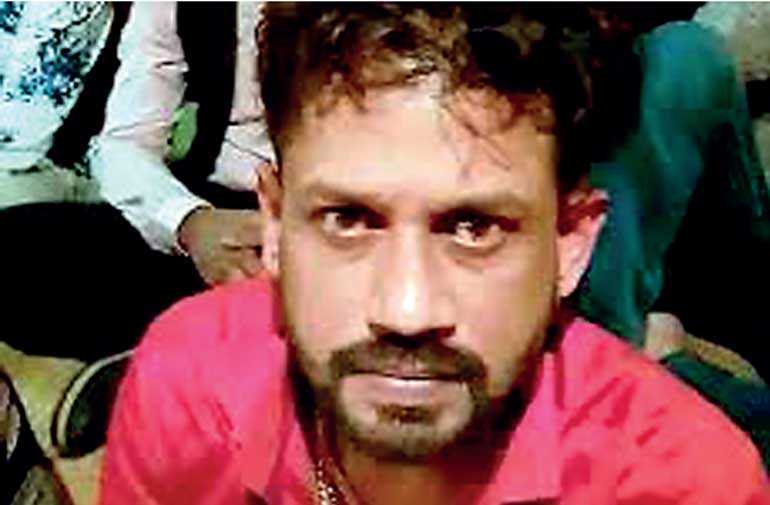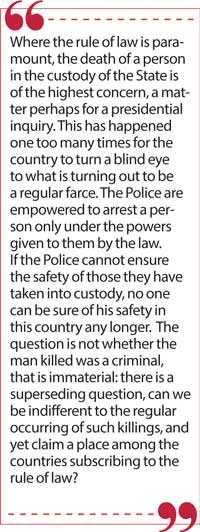Monday Feb 16, 2026
Monday Feb 16, 2026
Wednesday, 4 November 2020 00:00 - - {{hitsCtrl.values.hits}}

Makandure Madush is not the first to die in Police custody. In recent times, several detainees have met with violent deaths, while supposedly in the protection of our State. Alleged criminals, and even political activists, leading the Police to a scene of a crime, have fallen victim to what is described as a crossfire
Makandure Madush died the way he lived, violently, controversially. According to what is being said by the Police Spokesmen, Madush, who had been in Police custody for a few months now, had  volunteered information about a drug den.
volunteered information about a drug den.
Despite his long absence from the country, he was sure the location would yield incriminating evidence, and had agreed to lead the police there. We do not know whether their long investigative training decided the time of the raid; in the wee hours of the morning. If an assassination was planned, this was an ideal time. There are very few people about at that hour of the day. The target is isolated, the site is clear, there is little chance of collateral damage (harm to a third party).
As to the assassination, there are no witnesses save for the Police posse. If the motive was to silence him, Madush is silenced forever now. In the shootout, policemen too have received injuries. We are not certain how serious these injuries are. There is mention of a motorcycle left behind by the assassins. It may, or may not, yield a lead.
A scourge threatening the whole world
Although Makandure Madush had not been convicted for the offence, it is widely believed he was a big player in the local drug mafia. Needless to say, societies are destroyed and lives wrecked by the drug addiction, a scourge threatening the whole world. Today, nearly every country is a partner in the global war on drugs, countries like the US spending billions of dollars to battle the menace. Most countries have stringent laws in place, drug traffickers face life or even death sentences in courts of law.
Quoting from the Bible, it is commonly averred that wages of sin is death. Criminals who have brought indiscriminate ruin to countless lives cannot expect leniency from countries struggling desperately to protect their citizens. The odds against law enforcement agencies are high. Drugs bring in big money and the criminal mind is resourceful. With the accumulated black money, crime bosses buy political and even social power.
In poor countries, with large populations living in a frenetic state of want, their financial resources enable the drug barons to mock the system. They re-brand themselves as benefactors of the needy, may even get into national politics. With time, these crime bosses become pillars of religious  institutions, promotors of sports and patrons of the arts.
institutions, promotors of sports and patrons of the arts.
Invariably, the spotlight of law enforcement is focused on the petty street pedlars, the tough guys providing cover for drug operations or the pathetic addicts, the lowest ranks and the weakest links in the hierarchy of what is in fact a global crime syndicate. In this shadowy world, the hidden hands pulling the strings are powerful, faceless and anonymous, masters at flying below the radar.
Steady erosion of universal values
The high stakes battle against the drug menace is sorely testing the fortitude, resources and the legitimacy of many a state; particularly the small and weak nations. To fight the criminal, the state sometimes adopts the ways of the criminal, becomes a transgressor, is criminalised, the difference between the two is reduced to a matter of degree, not absolute, any longer. Here lies a danger that is even graver than the immediate enemy; a slow diminishing of the legitimacy of the State and the steady erosion of universal values that all civilised nations aspire to.
In a civilised country, the safest place for a citizen surely is the police station. Here is an objective and impartial force; sworn to uphold law and order, tasked to protect the individual and property. They investigate crime, but do not take the law into their own hands. To judge the guilt or innocence of an accused is a matter for the courts of law, after due process. The accused is presumed to be innocent, until proven guilty beyond reasonable doubt.
The state is not a criminal enterprise. It does not think and act like a criminal. In every aspect of its functions, the state is expected to affirm its moral superiority. A criminal may have murdered or plundered; the State will yet look at him objectively, and deal with him according to the law. Even the most despicable offender will be treated humanely, brought before a court of law, defended by lawyers and enjoy every protection offered by the law, including a right of appeal.
Introduction of regular police force to former colonies
When the concept of a regular police force was introduced to the former colonies of the Indian Subcontinent, it soon became apparent that to obtain the degree of public confidence the British constabulary enjoyed, a vast cultural leap was needed, a certain bluntness of mind and a coarseness of temperament had to be overcome.
Like the British model, the power and authority conferred on the native recruits to the newly-established constabulary, were confined by laws and regulations; not arbitrary. They were baffled, the law applied to the ruler as well as the ruled, to the policeman and the criminal, perhaps in the case of the former, as an officer of the law, even more stringently!
Conceptually, the workings of the new police force challenged the recruit’s idea of the world. Accustomed to the capricious powers of the old feudal order, office was viewed primarily as an opportunity for personal enrichment, service was something to be only played at. The customary corruption, the inherent bumptiousness and the insensate brutality, simmered under the surface. In countries where the British legal system prevails, confessions made to a police officer are admissible in a court of law. But in the Indian Subcontinent it was observed that policemen did not hesitate to extract confessions by torture or other forms of rough inducement. By making police confessions inadmissible in general, the people of the Subcontinent, to some degree, have been spared from torture aimed at extorting confessions.
Dying in Police custody
Makandure Madush is not the first to die in Police custody. In recent times, several detainees have met with violent deaths, while supposedly in the protection of our State. Alleged criminals, and even political activists, leading the Police to a scene of a crime, have fallen victim to what is described as a crossfire.
There is an eerie sameness in the scenario. Either the detainee, or a member of the gang found napping at the scene, suddenly opens fire or hurls a bomb at the armed Police posse, who, defending themselves shoot the detainee dead. There are no outside witnesses, only the Police team.
Where the rule of law is paramount, the death of a person in the custody of the State is of the highest concern, a matter perhaps for a presidential inquiry. This has happened one too many times for the country to turn a blind eye to what is turning out to be a regular farce. The Police are empowered to arrest a person only under the powers given to them by the law. If the Police cannot ensure the safety of those they have taken into custody, no one can be sure of his safety in this country any longer. The question is not whether the man killed was a criminal, that is immaterial: there is a superseding question, can we be indifferent to the regular occurring of such killings, and yet claim a place among the countries subscribing to the rule of law?
We read in the papers about efforts to extradite persons alleged to have committed various offences in this country, and now living overseas. If successfully repatriated, they are to face Sri Lankan courts after investigations by the Sri Lankan Police. Under the extradition laws, such cross country deportation is allowed, subject, among other things, to a fair trial in the requesting country.
For argument’s sake, let us say there is suspect X now living in a foreign country, alleged to have committed in Sri Lanka a fraud relating to sovereign bonds. His lawyers could well argue that such an extradition will place his life in jeopardy. The Police could take him to a place where some Treasury bonds are said to be hidden, under the certificates is a gun, there is a sudden shootout, the man is dead, the case is closed!
Crime is a nuanced concept
The common belief is that Makandure Madush amassed considerable wealth through his criminal activities. We have no reason to doubt this possibility; crime, particularly drugs, can bring in a lot of money. We also believe that the nature of underworld business is such that indeterminable sums of money have to be spent in its execution; to keep the gangs happy, to obtain the drugs, to arrange the transport, to buy protection and to bribe their way through. And, it is a hard life, accompanied at every stage by danger and uncertainty.
Crime is a nuanced concept, perception driven and relative. Who is to be condemned, who is to be embraced, is based on social imperatives, often ignorant, and almost always hypocritical. A person who kills one is a murderer. A soldier who kills 100 “enemies” is a hero.
There is also a common belief that most politicians, with neither inherited wealth nor a known source of income, end up accumulating wealth several times more than Makandure Madush ever could. And, they are serving the people!
Honore Balzac (1799-1850), the celebrated French writer, is known for his unvarnished portrayal of society. One of the originators of the tradition of realism in European literature, Balzac is credited with several perceptive observations, of universal as well as of timeless application.
“The secret of a great success for which you are at a loss to account is a crime that has never been found out, because it was properly executed” – Balzac.